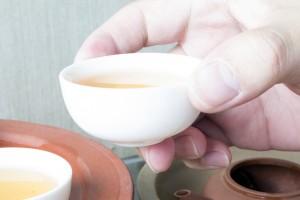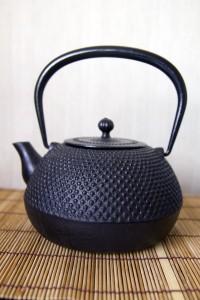In the first part of this series, I wrote that enjoying oolong tea is different from other types of tea.
This post, we will look at the essence of it.
First, let us look at Ye Wen Ling’s (叶文玲) “The Setting for Tea” (茶之境) again.
“却原来喝乌龙茶就是要这般小到不盈一握的茶具,
就是要一小壶一小壶的在炭火上泡煮,
就是要这种一次只能抿一口的小盅,
才厮磨得出细品慢咽的功夫”

“It turns out drinking oolong tea requires these tiny vessels,
Water boiled in small kettles repeatedly on a charcoal fire,
Using these tiny vessels that is only a mouthful at a time,
Only then can we discover the skill of appreciating oolong tea”
Here there are 3 main points which we will look at:
“Tiny Vessels”
I have made this point before, when it comes to gongfucha; it is not the bigger the better.
For a more definitive measurement, each cup is about 50 cc; filled to approximately 70% would be 35 ml.
Ideally the vessel should pour out completely in the cups, one person.
In other words, if there are 3 people, the vessel size should be circa 105 cc and so forth.
“Boiled in small kettles repeatedly”
This is not a repetition of the first point actually.
Boiling in small kettles repeatedly indicates a couple of things.

Generally tea aficionados recommend using freshly boiled water instead of re-boiled water as the later has higher mineral deposits due to evaporation which would in turn lead to flatter tasting tea.
What is the catch?
Effort.
It takes extra effort to boil, fill and boil another pot. Many people like to use an air-pot- hot water on demand- albeit one that is re-boiled ad infinitum.
It takes effort to enjoy oolong tea.
Not necessarily a lot of skill but at least a willingness to put in the effort rather than put a big pot and swig by the pint.
Second point here is the ‘repeatedly’.
It means oolong is best enjoyed freshly brewed.
Otherwise your small kettles wouldn’t need to be repeatedly boiled. One kettle would suffice.
Having a kettle and stove besides you would mean having to reach for it constantly, never a one-time affair.
“A mouthful at a time”
“只能抿一口的小盅”
抿 is a very descriptive word.
It is explained as 收敛嘴唇,少量沾取 or “puckering up the lips and dipping sparingly”,
In other words, not only is the sipping of a smaller quantity, it is done deliberately and slowly.
Not chugging it and swirling like it is Listerine.
Ye writings brings out 3 points
- Size- tiny vessels
- Effort or care
- Repeatedly brewed or freshly brewed
This in fact is the fundamentals of gongfu brewing.
The intricate link between gongfu brewing and oolong tea cannot be overstated.
At the same time, there is one last verse.
“Only then can we discover the skill of appreciating oolong tea”
There is a ‘skill’ of appreciating oolong tea but I rather look at it as a cultivated sensitivity.
In the next post we will look at the how and why of it.
See here for more articles related to tea appreciation.
